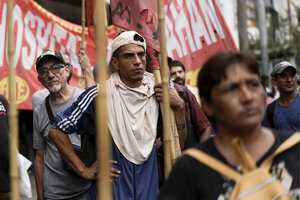Argentina inflation stings as people brace for president’s radical change

Demonstrators protest food scarcity and economic reforms in Argentina. President Javier Milei devalued the national currency by 50%, but that has not brought inflation under control.
Rodrigo Abd/AP
Buenos Aires, Argentina
Facundo De Luca’s year has been off to a rough start. Climbing gas prices have eaten into the 18-year-old driver’s income, and he’s frustrated by what he feels are endless financial constraints: “I go to the store, and I can’t buy anything for myself. It’s too expensive,” he says.
And yet Mr. De Luca, who works for a ride-hailing service, is feeling hopeful about the future of his country, which he sees as “prosperous,” he says. “I have faith.”
That trust lies in right-wing libertarian President Javier Milei, who came to office last December on a promise of turning Argentina’s economy around by drastically reducing government payouts, slashing the size of the state, and dollarizing the economy.
Why We Wrote This
How long are Argentines willing to wait for President Javier Milei to create economic change? Despite growing poverty, many say they’re behind him for the long haul.
Just over 100 days into his term, Mr. Milei is struggling to bring his banner proposals to fruition. His so-called omnibus bill, which included privatizing state-owned companies and granting the president the power to legislate, has stalled in Congress. On top of legislative struggles, inflation is projected to hit 275% annually, poverty levels have climbed over the past four months, and decreasing purchasing power is hitting all economic sectors.
But his die-hard supporters, an estimated 33% of the electorate, remain by his side.
In part, this is due to Mr. Milei’s fiery personality, and reliance on rhetoric that tears down traditional politicians whom he has convincingly blamed for Argentina’s decades of economic woes. He has also set clear expectations, at least in the short term: In February, Mr. Milei warned things would get worse for Argentines financially before they would get better.
But as the divisive leader hits dead end after dead end trying to move his reform package through Congress, observers question just how long his welcome mat will extend among Argentines hungry for change.
“His voters don’t expect legislative action” right away, says Paola Zuban, director of Argentine pollster Zuban Córdoba. “But they won’t be able to hold on for long.”
Economic baby steps?
Despite Mr. Milei’s lack of legislative progress, parts of the economy have shown tepid signs of stabilization. In January and February, due to his massive cuts to state spending, Argentina posted budget surpluses for the first time in almost 12 years. The country risk, a score investors use to gauge whether to invest, has decreased based on hopes that Mr. Milei will prioritize fiscal discipline. And thanks to a major currency devaluation, the once sizable gap between the official and parallel dollar exchange rates – which is the difference in what a dollar costs when exchanged through government-regulated channels versus what it goes for on the black market – has narrowed substantially.
But these changes haven’t made a tangible difference in day-to-day life.
Sergio Boh runs an empanada restaurant in the trendy Palermo neighborhood, where dining and nightlife draw hordes of foreign tourists each month. His costs have shot up since December, touching everything from the price of meat to the price of dough. That gets passed on to his patrons, with the menu price for his meat-filled turnovers nearly doubling since December.
“I don’t have any savings,” says Mr. Boh. “What I earn today I spend tomorrow.”
He works upward of 12 hours a day to keep the restaurant’s lights on and considers himself an ardent Milei supporter.
“I wanted change,” he says of his support. “There’s so much corruption here, not just in the government, but in the police, in hospitals, in schools,” which he expects Mr. Milei will resolve. He gives the president until December – one year in office – for his political and economic reforms to bear fruit.
Not all Milei voters are as optimistic.
“His level of popular support over the past 100 days has declined,” says Santiago Giorgetta, director of Buenos Aires-based pollster Proyección Consultores. Mr. Milei’s approval rate has fallen from 55% in December to 46% today, says Mr. Giorgetta.
“Hope”
It was the prospect of order, offered by Mr. Milei, that attracted Mr. De Luca to the president’s movement. Mr. De Luca, the young driver, cites government corruption, street protests, and violence as some of his primary concerns, issues on which he gives this administration solid marks so far.
But monthly inflation is one of the primary indicators that Mr. Milei’s supporters are watching, says Juan Cruz Díaz, director of Cefeidas, an Argentine political risk consultancy.
If Mr. Milei can give his voters “the sense that inflation is going down, that will give him a lot of credit,” says Mr. Giorgetta. There have been two consecutive months of disinflation – despite overall inflation remaining sky-high. And Mr. Milei might delay relaxations on certain price controls for another month or two to keep those figures low. It could provide concrete numbers to point to as he asks the population for more patience.
There’s also been a small shift in Mr. Milei’s base of support, which analysts say could serve as a boon. Those who supported center-right candidate Patricia Bullrich in the first round of last year’s general elections, and then went on to vote for the now-president, are emerging as his most die-hard supporters. They also tend to be slightly better off socioeconomically than the average Milei fan.
His more financially insulated backers could provide him with a cushion in dealing with political blows in the coming months, even if average citizens are struggling to make ends meet. The next round of policy negotiations is tentatively slated for May.
Roughly 43% of Argentines say they’ll give Mr. Milei between three and six months from when he took office to tackle the inflationary crisis, according to a recent poll by Proyección Consultores. Fewer than 20% give him more than a year.
Mr. Milei’s “connection with the population is his greatest asset,” says Mr. Cruz Díaz.
For now, that’s enough. But it will be very difficult for most Argentines “to tolerate the [fiscal] adjustments that are coming, even if they ideologically support Milei,” says Mr. Giorgetta.
“Hope,” he says, “is the last thing to die.”


